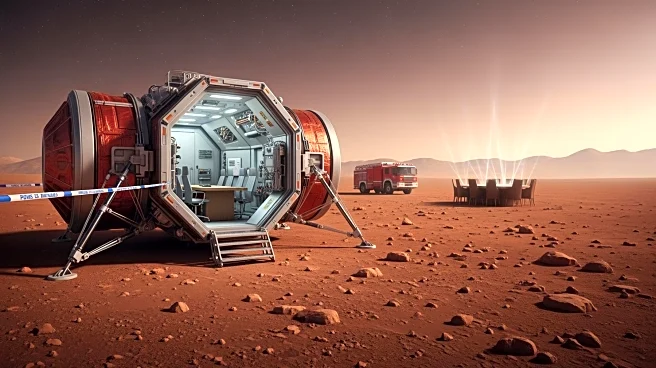What's Happening?
Mars simulations conducted by various research teams aim to understand the challenges of human habitation on the Red Planet. These simulations, such as NASA's Chapea mission, involve participants living
in confined spaces with limited resources to mimic conditions on Mars. Researchers study the psychological and physical effects of isolation, restricted environments, and resource scarcity. The simulations also explore the feasibility of growing crops and conducting scientific experiments in Martian-like conditions. Despite the harsh environment, some scientists and advocates remain optimistic about the potential for human settlement on Mars, driven by the desire to explore and expand human presence beyond Earth.
Why It's Important?
Understanding the challenges of living on Mars is crucial for future space exploration and potential colonization. These simulations provide valuable insights into the psychological and physical demands of long-term space missions, helping to develop strategies for maintaining crew health and performance. The research also contributes to the broader goal of establishing a human presence on Mars, which could have significant implications for scientific discovery, technological advancement, and international collaboration in space exploration. Additionally, the lessons learned from Mars simulations may inform efforts to address similar challenges on Earth, such as resource management and sustainable living.
What's Next?
As interest in Mars exploration grows, more advanced simulations and research projects are likely to be conducted to refine our understanding of the planet's environment and the requirements for human settlement. Future missions may focus on developing technologies for sustainable living, such as efficient life support systems and renewable energy sources. Collaboration between government agencies, private companies, and international partners will be essential to overcome the technical and logistical challenges of sending humans to Mars. The success of these efforts could pave the way for more ambitious space exploration initiatives, including missions to other planets and celestial bodies.
Beyond the Headlines
The prospect of human settlement on Mars raises ethical and philosophical questions about our responsibilities as a species. The potential for altering another planet's environment through terraforming or other means must be carefully considered, balancing scientific exploration with the preservation of natural ecosystems. Additionally, the challenges of living on Mars highlight the importance of addressing similar issues on Earth, such as climate change and resource depletion, to ensure a sustainable future for humanity.











